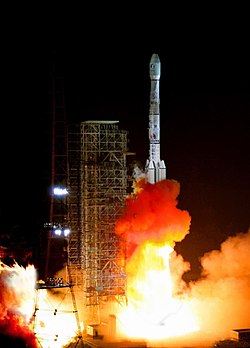Long March 3B

The launch of a Long March 3B carrier rocket at Xichang Satellite Launch Center.
|
|
| Function | Carrier rocket |
|---|---|
| Manufacturer | CALT |
| Country of origin | China |
| Size | |
| Height |
3B: 54.838 metres (179.91 ft) 3B/E: 56.326 metres (184.80 ft) |
| Diameter | 3.35 metres (11.0 ft) |
| Mass |
3B: 425,800 kilograms (938,700 lb) 3B/E: 458,970 kilograms (1,011,860 lb) |
| Stages | 3 |
| Capacity | |
| Payload to LEO | 12,000 kilograms (26,000 lb) |
| Payload to SSO | 5,700 kilograms (12,600 lb) |
| Payload to GTO |
3B: 5,100 kilograms (11,200 lb) 3B/E: 5,500 kilograms (12,100 lb) |
| Payload to GEO | 2,000 kilograms (4,400 lb) |
| Payload to HCO | 3,300 kilograms (7,300 lb) |
| Associated rockets | |
| Family | Long March |
| Derivatives | Long March 3C |
| Launch history | |
| Status | Active |
| Launch sites | LA-2 & LA-3, XSLC |
| Total launches |
3B: 13 3B/E: 25 Total: 38 |
| Successes |
3B: 11 3B/E: 25 Total: 36 |
| Failures | 3B: 1 |
| Partial failures | 3B: 1 |
| First flight |
3B: 14 February 1996 3B/E: 13 May 2007 |
| Last flight | 3B: 25 July 2015 |
| Boosters (3B) | |
| No. boosters | 4 |
| Length | 15.33 m (50.3 ft) |
| Diameter | 2.25 m (7 ft 5 in) |
| Propellant mass | 37,700 kg (83,100 lb) |
| Engines | 1 YF-25 |
| Thrust | 740.4 kN (166,400 lbf) |
| Specific impulse | 2,556.2 m/s (260.66 s) |
| Burn time | 127 s |
| Fuel | N2O4/UDMH |
| Boosters (3B/E) | |
| No. boosters | 4 |
| Length | 16.1 m (53 ft) |
| Diameter | 2.25 m (7 ft 5 in) |
| Propellant mass | 41,100 kg (90,600 lb) |
| Engines | 1 YF-25 |
| Thrust | 740.4 kN (166,400 lbf) |
| Specific impulse | 2,556.2 m/s (260.66 s) |
| Burn time | 140 s |
| Fuel | N2O4/UDMH |
| First stage (3B) | |
| Length | 23.27 m (76.3 ft) |
| Diameter | 3.35 m (11.0 ft) |
| Propellant mass | 171,800 kg (378,800 lb) |
| Engines | 4 YF-21C |
| Thrust | 2,961.6 kN (665,800 lbf) |
| Specific impulse | 2,556.5 m/s (260.69 s) |
| Burn time | 145 s |
| Fuel | N2O4/UDMH |
| First stage (3B/E) | |
| Length | 24.76 m (81.2 ft) |
| Diameter | 3.35 m (11.0 ft) |
| Propellant mass | 186,200 kg (410,500 lb) |
| Engines | 4 YF-21C |
| Thrust | 2,961.6 kN (665,800 lbf) |
| Specific impulse | 2,556.5 m/s (260.69 s) |
| Burn time | 158 s |
| Fuel | N2O4/UDMH |
| Second stage | |
| Length | 12.92 m (42.4 ft) |
| Diameter | 3.35 m (11.0 ft) |
| Propellant mass | 49,400 kg (108,900 lb) |
| Engines | 1 YF-24E (YF-22E (Main) 4 x YF-23C (Vernier)) |
| Thrust | 742 kN (167,000 lbf) (Main) 47.1 kN (10,600 lbf) (Vernier) |
| Specific impulse | 2,922.57 m/s (298.019 s) (Main) 2,910.5 m/s (296.79 s) (Vernier) |
| Burn time | 185 s |
| Fuel | N2O4/UDMH |
| Third stage | |
| Length | 12.38 m (40.6 ft) |
| Diameter | 3.0 m (9.8 ft) |
| Propellant mass | 18,200 kg (40,100 lb) |
| Engines | 1 YF-75 |
| Thrust | 167.17 kN (37,580 lbf) |
| Specific impulse | 4,295 m/s (438.0 s) |
| Burn time | 478 s |
| Fuel | LH2/LOX |
The Long March 3B (Chinese: 长征三号乙火箭, Chang Zheng 3B), also known as the CZ-3B and LM-3B, is a Chinese orbital carrier rocket. Introduced in 1996, it is launched from Launch Area 2 and 3 at the Xichang Satellite Launch Center in Sichuan. A three-stage rocket with four strap-on liquid rocket boosters, it is currently the most powerful member of the Long March rocket family and the heaviest of the Long March 3 rocket family, and is mainly used to place communications satellites into geosynchronous orbits.
An enhanced version, the Long March 3B/E, was introduced in 2007 to increase the rocket's GTO cargo capacity and lift heavier GEO communications satellites. The Long March 3B also served as the basis for the medium-capacity Long March 3C, which was first launched in 2008. As of December 2016[update], the Long March 3B and 3B/E have conducted 35 successful launches, plus one failure and one partial failure, giving it a success rate of 94.6%.
The development of the Long March 3B began in 1986 to meet the needs of the international GEO communications satellite market. During its maiden flight on 14 February 1996 carrying the Intelsat 708 satellite, the rocket suffered a guidance failure two seconds into the flight and destroyed a nearby town, killing at least six people, but outside estimates suggest that anywhere between 200 and 500 people might have been killed. However, the author of later ruled out large casualties, because evidence suggest that the crash site is evacuated before launching.
...
Wikipedia
